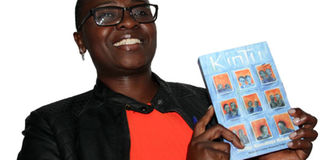Prime
Jennifer Makumbi narrates the Ugandan story in Kintu

Makumbi displays a copy of her novel during its launch at the National Theatre last week. PHOTO by Faiswal kasirye
What you need to know:
Telling it. According to Makumbi, the Ugandan story was not being told “properly”, especially through the Western literature. It is upon this background that she penned Kintu.
In 2001, Jennifer Nansubuga Makumbi left Uganda to study Masters in Creative Writing at Manchester University, United Kingdom and 12 years later, she won the Kwani Manuscript Project in 2013 in Kenya, with her historical novel, Kintu. Makumbi’s won out of the 280 manuscripts that were submitted by different African writers. Makumbi was looking for better writing opportunities abroad but instead she returned to Kampala to launch her novel, Kintu.
The novel was inspired by Makumbi’s urge to tell the Ugandan story, which she felt was skewed, especially in the West. “I wanted to bring the Ugandan story to the literary table with the rest of Africa,” Makumbi said at the launch of her novel at the National Theatre. The novel was launched during the Writivism festival held last week in Kampala.
Makumbi wrote her first play when she was 15 years old, in Senior Three for her (Theresa) House at Trinity College Nabbingo. The play won third place in the competition.
She started writing Kintu in 2003 and completed it in 2011.
Her novel, Kintu, starts with a prologue about Kamu Kintu, who is brutally murdered by a mob in Bwaise, a Kampala suburb, at dawn, on Monday January 5, 2004.
The prologue is written with an intensity that seduces you to keep reading. Even though it is a brutal murder, you will be so glued to the story that if you read it while cooking, the food will certainly burn.
The novel then takes you back to 1750, to the beginning of the curse in the old kingdom of Buganda. Kintu follows the misfortunes of the Kintu clan more than 250 years ago, blending Ganda oral tradition, forms of myth, folktale and history with biblical elements. The novel explores ideas of transgression, curse and perpetuity, looking back at the history of Buganda Kingdom and tracing the birth of modern Uganda.
Makumbi makes the Kintu story her own and she spices it with Luganda words, which give her the authority and power to weave Kintu’s story and his descendants as she likes, guided by facts. You will believe that she knows the Kintu she is talking about. You will not be bogged down by her research materials because they are brilliantly married into the story.
This story will make you laugh, cry, wonder and question. But most of all, you will enjoy reading it.
Makumbi is currently working on her second novel, Nnambi.
Recently, she was announced in Kampala as the overall winner of the 2014 Commonwealth Short Story Prize targeting new and emerging writers from the Commonwealth for her short story, Let’s Tell This Story Properly.
What they say
Jamal Mahjoub. He is chairperson of judges at Kwani Manuscript Project. He described the novel as “an ambitious attempt to bring the history of Uganda into the present lives of the novel’s protagonists. Through successive generations, the author sketches out the continued relevance of the past in the present.”
Mbugua Wa Mungai. Another judge, he said: “I doubt there is a reader who, being familiar with life in contemporary Africa beyond a superficial grasp of its dramatic twists and abrupt turns, can come away from a reading experience of Kintu empty-handed. The text has a contemplative quality worth giving serious thought to.”




